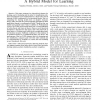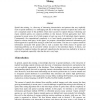75 search results - page 8 / 15 » A Theory of Hierarchical Consequence and Conditionals |
SIAMCO
2008
15 years 1 months ago
2008
This paper builds a new theoretical connection between singular control of finite variation and optimal switching problems. This correspondence provides a novel method for solving ...
124
click to vote
TNN
1998
15 years 1 months ago
1998
— This paper proposes two hierarchical schemes for learning, one for clustering and the other for classification problems. Both schemes can be implemented on a fuzzy lattice neu...
SYNTHESE
2010
15 years 2 days ago
2010
: Some intuitive normative principles raise vexing „detaching problems‟ by their failure to license modus ponens. I examine three such principles (a self-reliance principle and...
168
click to vote
VLDB
1997
ACM
15 years 5 months ago
1997
ACM
Spatial data mining, i.e., discovery of interesting characteristics and patterns that may implicitly exist in spatial databases, is a challenging task due to the huge amounts of s...
121
click to vote
NIPS
2008
15 years 3 months ago
2008
Hierarchical probabilistic modeling of discrete data has emerged as a powerful tool for text analysis. Posterior inference in such models is intractable, and practitioners rely on...


